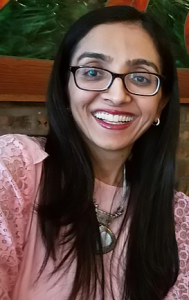Salima Hemani, a PhD candidate at the Lawrence Bloomberg Faculty of Nursing, has become the first registered nurse to win the SANSAR Burgundy Young Investigator Award recognizing the impact of her research on the health of the South Asian community.
SANSAR, the South Asian Network Supporting Awareness and Research, focuses specifically on promoting cardiovascular health in the South Asian Community, through education, community awareness and research. Hemani’s own work has shown members of the South Asian community how to successfully mitigate an early diagnosis of hypertension through education and awareness.
“I have always believed in prevention as a way to manage disease,” says Hemani. “This award provides recognition and support for the work I am doing to help make our communities healthier.
Hemani strongly believes that nurses and nurse practitioners are perfectly situated to help prevent disease because they take the time and effort to educate their patients. Throughout her nursing career, Hemani has seen how the diet of many of her South Asian patients has resulted in an increase in hypertension, obesity, and diabetes.
Hypertension in particular, is very prevalent among individuals of South Asian descent. According to Hemani, many do not have the appropriate knowledge they need to select low sodium food options or to cook low sodium foods.
“A lot of current materials about hypertension and prevention are not culturally relevant,” says Hemani, “They do not always account for the different types of foods and diets that people are used to consuming.”
To remedy this, Hemani sought to conduct a multi-method study aimed at examining the feasibility of a community-based low sodium dietary intervention among hypertensive individuals in the regions of Markham and Scarborough; communities with larger South Asian populations. The intervention aimed to increase knowledge and modify behaviours via five online intervention modules and telephone calls to study participants.
The intervention was not only highly acceptable among community members but was also feasible in helping many to reduce their sodium intake, with simple weekly goals, such as removing table salt one week, followed by removing a high sodium South Asian spice the next. The modules also offered instructions on how to read labels for sodium levels, and how to manage the change in diet within a family setting, to help boost uptake and motivation to continue with a healthy lifestyle.
“The virtual cooking demonstration were a real success,” says Hemani. “People could access the modules from the comfort of their home, and it showed how invested people were in educating themselves.”
Despite setbacks due to the onset of the pandemic on her study limitations, Hemani is looking forward to further studies with larger sample sizes and expanding the geographical area to include additional communities in the GTA and even internationally, with options to engage participants in Pakistan.
“I’m very hopeful that with this award, I will be able to carry this work forward and continue to use digital technology, mobile apps and more to make an impact with preventative strategies,” says Hemani. “Research by nurses and nurse practitioners can create something very meaningful for communities.
Hemani’s doctoral research is supervised by Associate Professor Monica Parry.
